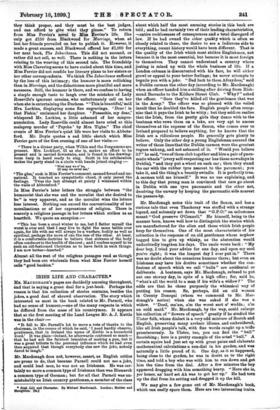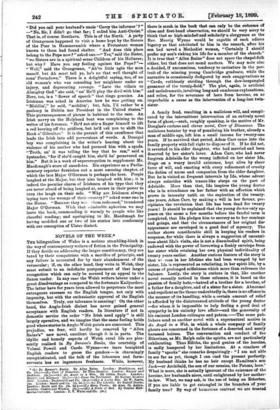IRISH LIFE AND CHARACTER.*
Mn. MAC DONAGH'S pages are decidedly amusing throughout, and that is saying a great deal for a jest-book. Perhaps the reason is that his collection of stories contains, besides the jokes, a good deal of shrewd observation. The story which interested us most in the book related to Mr. Parnell, who had no sense of humour,—one of the many respects in which he differed from the mass of his countrymen. It appears that at the first meeting of the Land League Mr. A. J. Kettle was in the chair :— " It fell to Mr. Parnell's lot to move a vote of thanks to the chairman, in the course of which he said, ` I need hardly observe, gentlemen, that in Ireland the name of Kettle is a household word.' It was plain—indeed, he afterwards confessed so much— that he had not the faintest intention of making a pun, but it was a great tribute to the personal influence which he had even then acquired that though everybody else saw the joke, nobody dared to laugh."
Mr. Macdonagh does not, however, assert, as English critics are prone to do, that because Parnell could not see a joke, and could lead men, he was not an Irishman. He was cer- tainly no more a common type of Irishman than was Bismarck a common type of German; but for all that Parnell was un- mistakably an Irish country gentleman, a member of the class
• Irish Life and Character. By Michael Macdonagh. London: Hodder and Stoughton. re.) about which half the most amusing stories in this book are told ; and he had certainly two of their leading characteristics, —entire recklessness of consequences and a total disregard of law. If he had owned the other quality which is often so closely related to these, the desire to see a ludicrous side to everything, recent history would have been different. That is the quality of the Irish which most strikes Englishmen, not because it is the most essential, but because it is most foreign to themselves. They cannot understand a country where jesting is mixed up with the whole business of life. If a London cabman is discontented with his fare, he will either growl or appeal to your better feelings ; he never attempts to beguile you with a joke. " Bad luck to them Afraydees," said a Dublin carman the other day (according to Mr. Macdonagh) when an officer handed him a shilling after driving from Rich- mond Barracks to the Kildare Street Club. " Why ?" asked the officer. "Sure they've killed all the gentlemen that was in the Army." The officer was so pleased with the veiled insult that he doubled the fare. English people often recog- nise that it pays the Irish to be witty ; but they seldom realise that the Irish, from the pretty girls they dance with to the boatman who rows them on a lake, are very apt to amuse themselves at the expense of the Saxon, who comes over to Ireland prepared to believe anything, for he knows that the Irish are a ridiculous people. He generally gets plenty to believe. Only the other day a young Englishman assured the writer of these lines that the Dublin carmen were the greatest rogues unhang, and not ashamed of it. " Would you believe it?" he said, "two of them club together and hire a pair of pneu- matic wheels" (every self-respecting car has these nowadays in Dublin), " and they put a wheel on each car ; then they stand the car with the rubber tyre nearest to the pavement; you take it, and the thing's a beastly swindle. It is perfectly true. A carman told me himself." It was no use explaining, and to this day that young man is convinced that cars go about in Dublin with one tyre pneumatic and the other not, deceiving the unwary by keeping the pneumatic side nearest the passers-by.
Mr. Macdonagh notes this trait of the Saxon, and has a curious tale that even Thackeray was stuffed with a strange legend, and solemnly set down that " G.P.O." on milestones meant " God preserve O'Connell." He himself, being to the manner born, knows well how to distinguish the stories which are manufactured for the alien and those which Irish people keep for themselves. One of the most characteristic of his collection is the response of an old gentleman whose nephew begged him to give up whisky, as the abstention would undoubtedly lengthen his days. The uncle wrote back : " My dear boy, I tried your advice for one day, and upon my soul you're right ; it was the longest day I ever put in." There was no doubt about the conscious humour there; but even an Irishman may have his doubts sometimes whether the con- fusions of speech which we call " bulls " are accidental or deliberate. A boatman, says Mr. Macdonagh, refused to put out one stormy day, in spite of a high offer; for, said he, " what's all the world to a man if his wife's a widow ? " The odds are that he chose purposely the whimsical way of putting his reason. So, perhaps, did an old woman in County Donegal (whom we commend to Mr. Mac- donagh's notice) when she was asked if she was a widow. "'Deed, ma'am, a'm the worst sort o' wtnida ; a'm an ould maid." Mr. Macdonagh, by the way, could enlarge his collection of " flowers of speech" greatly if he studied the -Ulster folk, whose dialect is a very odd mixture of Scotch and English, preserving many archaic idioms, and embroidered, like all Irish people's talk, with fine words caught up a trifle promiscuously. In Ulster, too, you can find the "bull" flourishing ; here is a pretty example of the acted " bull." A certain squire had just set up with great pains and elaborate mathematical calculations a sun-dial in his garden, and was naturally a little proud of it. One day, as it so happened, being close to the garden, he was in doubt as to the right time, and told a boy who was with him to run down and get him the time from the dial. After a few minutes the boy appeared dragging with him something heavy. "Here she is, yer honer, an' hard set Ah was to get her up." He had torn up the dial from its setting and dragged it up the hill.
We may give a few gems out of Mr. Macdonagh's book, which can easily spare them. Here are two interesting traits. " Did you call your husband's uncle ' Carey the informer' ?" —"No. Sir, I didn't go that far ; I called him Anti-Christ." That is, of course. Southern. This is of the North. A party of Orangemen happened to visit a home kept by the Sisters of the Poor in Hammersmith where a Protestant woman known to them had found shelter. "And does this place belong to the Pope now ?" asked one.—" Yes," said the Sister, "we Sisters are in a spiritual sense Children of his Holiness; but why ? Have you any feeling against the Pope ?"— " Well," said the Orangeman, "Ah've little agin the mon maself. but Ah must tell ye, he's no that well thought of ronn' Portadown." There is a delightful saying, too, of an old woman's who was consoling her neighbour under an injury, and deprecating revenge. " Lave the villain to Almighty God " she said, " an' He'll play the div il with him." Here, too, is a " flower of speech" that rings genuine. An Irishman was asked in America how he was getting on. "Middlin'," he said, " middlin'; but, fair, I'd rather be a gaslamp in Dublin nor President in the United states." This picturesqueness of phrase is habitual to the race. An Irish navvy on the Holyhead boat was complaining to the writer of his foreman. "He'd not stir a finger himself to lift a red herring off the gridiron, but he'd ask you to shift the Rock o' Gibraltar." It is the pursuit of this excellence that leads the Irish into odd perversions of words. A Donegal boy was complaining in the writer's hearing about the violence of his mother who had pursued him with a spade. "Troth, an' it was telling the boy that he ran," said a bystander, "for if she'd caught him, she'd ha' persevered on him." But it is a work of supererogation to supplement Mr. Macdonagh's store of anecdotes. His experience as a Parlia- mentary reporter furnishes out a most amusing chapter, of which the late Major O'Gorman is perhaps the hero. People laughed at the Major, but they also laughed with him ; it is indeed the peculiar charm of Irishmen of his type that they are never afraid of being laughed at, secure in their power to turn the laugh on their side. " Why are Irishmen always laying bare the wrongs of their country? " asked some one in the House. "Because they war, them redressed," thundered Major O'Gorman. With that admirable aphorism we may leave the book, commending it warmly to people who like cheerful reading ; and apologising to Mr. Macdonagh for having modified one or two of his stories into conformity with our conception of Ulster dialect.







































 Previous page
Previous page